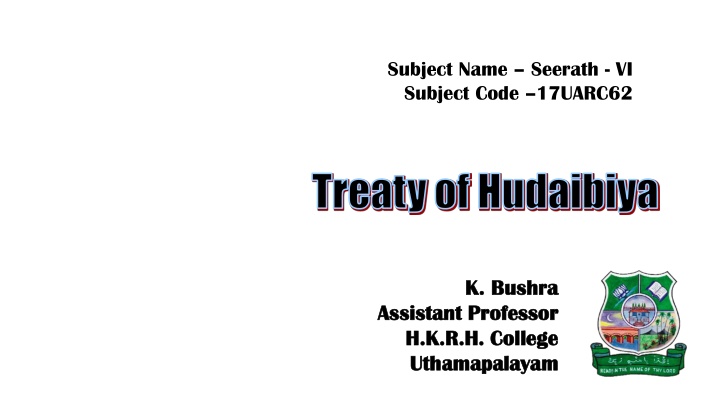
History of Treaty of Hudaibiya in Seerah Studies
Explore the background, pledge before the treaty, and details of the Hudaibiya Treaty in Islamic history, including Muslim responses and key events. Learn about the diplomatic negotiations and implications of this pivotal moment during the time of the Holy Prophet.
Download Presentation

Please find below an Image/Link to download the presentation.
The content on the website is provided AS IS for your information and personal use only. It may not be sold, licensed, or shared on other websites without obtaining consent from the author. If you encounter any issues during the download, it is possible that the publisher has removed the file from their server.
You are allowed to download the files provided on this website for personal or commercial use, subject to the condition that they are used lawfully. All files are the property of their respective owners.
The content on the website is provided AS IS for your information and personal use only. It may not be sold, licensed, or shared on other websites without obtaining consent from the author.
E N D
Presentation Transcript
Subject Name Seerath - VI Subject Code 17UARC62 Treaty of Hudaibiya K. K. Bushra Bushra Assistant Professor Assistant Professor H.K.R.H. College H.K.R.H. College Uthamapalayam Uthamapalayam
Content Background History The Pledge before Treaty The Hudaibiya Treaty Muslim responces to the treaty Treaty of Hudaibiya and Mustaliq
Background History In 628 C.E. after six years of Hijrah from Makkah the city of their birth. This six years three battles fought against the Quraish, the battles of Badr, Uhud, and the Ditch. After the Battle of the Ditch, the Quraish had lost the initiative which now came to rest with the Muslims. the Holy Prophet decide to visit Makkah witto performing the Hajj. Quraish came to know they sent Khalid b Walid and Ikrama b Abu Jahl with two hundred horsemen to intercept the Muslims and prevent their entry into Makkah. The Holy Prophet consulted whether they return to Madina or continue to Makkah. The consensus of opinion was that they should go ahead and if the Quraish chose to fight, they would also fight; otherwise, not. After a weary march, the Muslim caravan comprising one thousand men reached Hudaibiya on the lower side of Makkah, and within the sacred territory for the purposes of the pilgrimage.
The Pledge Before Treaty The Muslims encamped at Hudaibiya, and here Urwa b Masud, a son-in law of Abu Sufyan, came to see the Muslims on behalf of the Quraish. He talked in diplomatic language and tried to impress that the Quraish were strong, and would not allow the Muslims to visit Makkah. He also insinuated that at the time of crisis, the followers of the Holy Prophet were likely to leave him. Thereupon Abu Bakr flared up and said: "May God curse you; how dare you think that we will abandon the Holy Prophet. Rest assured, we will stand by him, whatever the cost, and will fight for him to the last." While talking, Urwa in the usual Arab way pushed his hand too close to the beard of the Holy Prophet. A companion who stood near warned him "Keep your hands away from the beard of the Holy Prophet for the hand that touches the sacred beard would be cut." When Urwa returned to Makkah, the Holy Prophet sent Othman with him to assure the Quraish that the Muslims merely wanted to perform the Hajj and they had no intention of fighting against the Quraish. When Urwa returned to the Quraish, he gave his impressions about the Holy Prophet and the Muslims in the following terms: "O people of the Quraish I have seen kings, but by God I have never seen any king as I have seen Muhammad amongst his companions. If he makes his ablutions, they would not let the waterfall on the ground; if a hair of his body falls they pick it up. They will not surrender him for anything in any case, do what you may". Othman met the Quraish leaders, but they adopted delaying tactics. When Othman took long to come, a rumor got current in the Muslim camp that Othman had been killed by the Quraish. Thereupon all the Muslims took the pledge that they would fight against the Quraish to seek revenge for the murder of Othman.
The HudaibiyaTreaty When the Muslims were poised to take up arms and attack Makkah, Othman returned to the Muslim camp with Suhail b Amr, whom the Quraish sent to negotiate a treaty with the Muslims. Suhail was notorious for his hostility to Islam. when the Holy Prophet declared his mission. He had fought in the Battle of Badr and had been taken captive. After a lengthy discussion, the Holy Prophet and Suhail came to terms and agreed to execute a treaty. Ali was commissioned to draft the treaty. The Holy Prophet dictated that it was a treaty between Muhammad, the Prophet of Allah, and the Quraish. Suhail objected to the preamble on the ground that the Quraish did not acknowledge him as the prophet of God and as such the reference to his prophet hood should be omitted. Ali did not agree to omit the relevant words. Thereupon the Holy Prophet omitted these words himself. According to the treaty of Hudaibiya, truce was declared between the Muslims and the Quraish for ten years. 1. If any tribe wished to enter into treaty with the Muslims it could do so, and whoever wished to enter into a treaty with the Quraish was likewise free to do so. 2. If any one from the Quraish came to the Muslims and was converted to Islam he was to be returned to the Quraish. 3. On the other hand, if a Muslim sought refuge with the Quraish, he was not to be delivered to the Muslims. It was further stipulated that the Muslims would withdraw that year without performing the Hajj, but they would be free to perform the Hajj the following year when they could stay in Makkah for three days.
Muslim responcesto the treaty Prima facie the pact was loaded in favor of the Quraish and most of the Muslims were critical of its terms. Abu Bakr and Ali, however felt that the Holy Prophet knew things better than what his followers could comprehend, and that what appeared to be disadvantageous to the Muslims might ultimately turn to their advantage. Umar waited on the Holy Prophet, and gave expression to his dissatisfaction with the terms of the treaty. The Holy Prophet assured him that whatever he had done was under the command of God, and that the terms which appeared to he against the interest of the Muslims would turn out to their favor. While on the way back to Madina, God sent a revelation that the treaty was a victory for the Muslims. In later years some one asked Ali as to how the treaty of Hudaibiya was a victory for the Muslims when the terms thereof were apparently in favor of the Quraish. Ali pointed out that during the previous seventeen years the Quraish had been waging a war against the Muslims sometimes cold, sometimes hot. It was stipulated that a Muslim who sought refuge with the Quraish was not to be returned to the Muslims, but someone from the Quraish who sought refuge with the Muslims was to be returned to the Quraish. Apparently the stipulation was against the Muslims, but it was really not so. When a Muslim were to seek refuge with the Quraish, it would obviously be a case of apostasy, and there was no advantage in pressing for the return of a person who had ceased to be a Muslim. When a man from the Quraish sought refuge with the Muslims, and was later returned to Quraish, there were two possibilities. If his faith in Islam was strong, he would still remain a Muslim, and was likely to cause the conversion of other people to Islam.
Treaty of Hudaibiyaand Mustaliq Early in A.D. 628 the Holy Prophet decided to proceed to Mecca to perform the pilgrimage. He was accompanied by companions about fourteen hundred in number. Umar also accompanied the Holy Prophet. In order to convince the Quraish that the Muslims had no war-like intentions against them, the Holy Prophet decided that they would carry no arms. When the Muslims halted at Zul Hulaifah six miles from Madina Umar waited on the Holy Prophet and submitted that no reliance could be placed on the Quraish and accordingly it was unsafe to proceed to Mecca without arms. Umar urged that for self-defense the Muslims should be armed. The Holy Prophet accepted the advice of Umar, and some persons were sent to Madina to bring in arms. When the Quraish of Mecca came to know that the Muslims were coming to Mecca they sent Khalid bin Walid and Ikramah bin Abu Jahl with two hundred horsemen to intercept the Muslims, and prevent their advance to Mecca. Finding the way to Mecca barred the Holy Prophet consulted his companions as to what course of action they should adopt. The consensus of opinion was that they should go ahead. If they were stopped they would fight; otherwise not. The Holy Prophet enquired of his companions whether any one out of them could lead the Muslims to Mecca by a path other than the main route barred by the enemy. One of the companions volunteered to show an alternative way. He led the Muslims on a way full of rough rocks through the ravines of Mudniya. After a weary march the Muslims reached Hudaibiya on the lower side of Mecca and within the sacred territory. The Muslims encamped at Hudaibiya, and here Urwa bin Masud came to see the Holy Prophet on behalf of the Quraish. He talked in diplomatic language, and tried to impress that the Quraish were strong and would not allow the Muslims to visit Mecca. He also insinuated that at the time of crisis the followers of the Holy Prophet were likely to leave him. Thereupon the companions of the Holy Prophet said, "May God curse you; how dare you think that we will abandon the Holy Prophet. Rest assured we will fight to the last for him".




